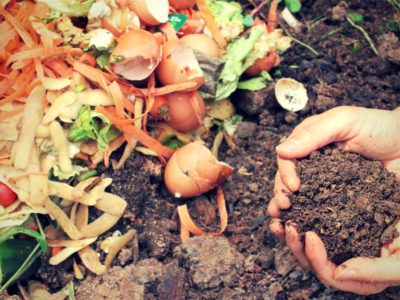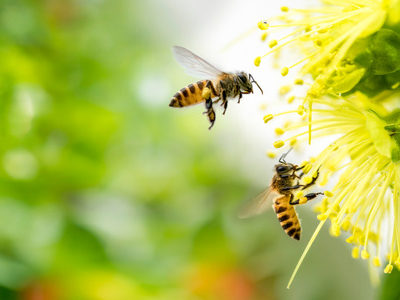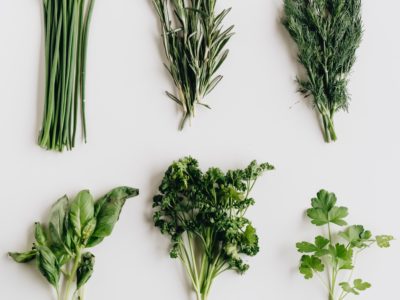Table of Contents[Hide][Show]
What Is Compost?
Compost is just decomposed organic materials. While composting may seem complicated, it’s actually really simple and easy to do. Composting involves a combination of broken down and unbroken down plant matter that is left on the forest (or your garden) floor. The end product is a rich, soft soil. It’s amazing how a natural process can transform everyday waste into a gardener’s fortune. Not only is composting good for the garden, it’s our environmental responsibility to breakdown organic waste rather than ditching it in landfills.
Why Compost?
Inefficiencies abound at every link in the American food distribution chain. It is estimated that 7% of all produce grown is abandoned in the field, and almost 50% of what is picked never leaves the farm due to cosmetic deficiencies, despite being edible.
Yet more nutritious food is discarded en route to markets and distribution centers, and once at the market over $15 billion dollars of fresh food is tossed thanks to the nebulous “sell-by” concept, which leads to perfectly good food being sent to the dump more out of a need to look good than for any concern for customer’s health.1
Yet all of that pales in comparison to what happens once the food gets to our homes. The average American tosses out between 16 and 25 percent of the food that they bring home, which amounts to a staggering yearly average of $2,200 down the drain. Some food waste is inevitable, but our present arrangement is almost comically poorly-designed, and places an undue burden on our planet.
The Compost Solution
In response to this rampant wastefulness, a growing number of Americans of all ages, classes, and backgrounds have discovered a way to radically draw down their trash and, in turn, reduce their overall carbon footprint. More and more people are diverting their unused food from the waste stream by composting at home and advocating for composting programs for their municipalities.
The more we compost, the less we contribute to the volume of solid materials in our landfills. Also, by using compost to feed your lawn, you can ditch those awful chemical fertilizers! Not only will you be saving money, but your lawn and garden will thrive from natural nutrients.
When done correctly, composting food helps to create rich, nutrient-dense fertilizer for farms and gardens, doesn’t smell, and has the added benefit of encouraging more mindful shopping habits that emphasize whole foods over packaged and processed alternatives.
A Gardener’s Gold
Compost is a priceless asset for our gardens. It improves the quality of the soil by changing its structure. By making the soil the right consistency, it maximizes its ability to hold the right amount of moisture and air. This in turn supports the growth of healthier and more productive plants. Compost also has the ability to transform nutrient deficient clay soil into rich, moisture holding, loamy soil. Compost provides all of the essential nutrients for healthy plant growth, and it almost always slowly releases those nutrients to the plants so that there is a consistent intake of essential nutrients.
Here’s a little primer on how to get started with your own home composting project based on how much space you have, as well as the tools to encourage your town, city, or county to empower its citizens with the resources to make the process even easier.
What’s the Best Way to Compost?
Well, it depends on your lifestyle! There are so many different methods of composting, some requiring a lot of space while some methods require minimal space. All you have to do is identify how much space you have and then determine how much of that space you want to dedicate to composting.
If you have a huge plot of land, pick any spot that’s close to your garden. But don’t be discouraged if you only have a little bit of room. Even city dwellers can effectively maintain a small compost pile.
How To Compost In Your Home
Most people begin the compost process inside their homes. Even if you have the space for backyard composting, this is saves you from taking a trip to your compost pile or bin every single time you have some vegetable scraps.
However, the foremost challenge in composting is keeping the discarded food sanitary and your home free of the smell of rot. There are a few ingenious solutions to that hurdle.
The first is a countertop system to deal with food scraps as you create them.
Almost any food that you don’t want to eat is good fodder for soil—though you should take precautions. The low pH of citrus means that you can create a separate pile for it, and cooked meat and fish can potentially nourish parasites that you may want to avoid. So focus on the plant foods: the scraps and the leftovers.
You can either use a regular sealed mason jar and napkin, an affordable aerating jar like this one on Amazon, or keep it in the freezer to totally eliminate odors until you are ready to dispose of it outside.
Once your bin is full, this is where the paths separate depending on if you are a city dweller or a homesteader in a suburban or rural area.
Urban Composting
For the many of us who live in cities, you need community and/or municipal support to compost: either an outdoor system at your local community garden, or in a dedicated bin at your neighborhood farmers’ market that will send the compost to be utilized in urban gardening projects.
Many cities including New York and Portland have taken the step of adding food scrap bins to their waste removal services, supplying buildings with bins that get picked up by a separate team and delivered to large-scale composting facilities to be processed.
In other cities like L.A. and Chicago, activists have picked up the slack and created community compost pickup and processing organizations.
Composting In Your Own Yard
For those with a yard of their own, the responsibilities (and the benefits!) extend further. Once you’ve filled your bin, you need to begin the process of turning that stinky, mouldering food into luscious brown fertilizer. There are a number of different approaches to this that all work well if done if four principles are followed: the right ingredients, air circulation, consistent moisture, and adequate volume.
A great breakdown of the differences between manufactured compost bins, compost tumblers, wire collectors, wooden bins, pallet bins, and multi-bin systems can be found in this post.
The alternative to all of them is to ‘go natural’ and to process the food scraps right in the ground with trench composting, raised-bed garden integration, sheet composting, or the covered windrow method.
Don’t let all this overwhelm you though! Materials aside, there are two basic kinds of compost piles: open bins and enclosed containers.
Open Bin Composting
Open bins can be constructed with wood, chicken wire, or recycled plastic. You can buy these or even make one yourself! The trick is to be sure that there are no complete walls, because you will have to rotate the compost so that it can breathe and break down.
Enclosed Container Composting
Enclosed containers usually come in two designs: either an upright box container or rotating drum.
What Do You Need to Start Composting?
Compost is the result of providing the right mixture of key ingredients for the microorganisms that do all the munching. These microorganisms will eat, multiply, and convert raw materials to compost as long as the environment is right. All you need is food, water, and air!
Water and air come naturally, but the food element can be a bit more complex… just a tiny bit! The food we put into our compost consists of two categories: “greens” and “browns”. Green materials are moist and high in nitrogen, while brown materials are dry and high in carbon.
Green
- Fresh (green) grass clippings
- Kitchen scraps (fruit, vegetables, coffee grounds, tea bags)
- Weeds
- Green leaves
Brown
- Brown, dry leaves
- Dried grass
- Sawdust
- Straw
The best balance of compost materials is roughly four parts “browns” to one-part “greens”. If you have more browns in the mix, it will probably produce the same result, but will take more time. If you have more greens on the other hand, things can get really smelly, really fast!
Assuming you’ve got the right balance, within a few months, your old scraps will have turned into the fodder for future delicious produce and a healthy garden.
Maintaining Your Compost
It’s important to keep your compost moist because the process is a biological function. If the pile dries out, the biological function slows down to almost a stop. At the right moisture level, the pile becomes a vibrant community of hundreds of microorganisms working away to break down and stabilize those nutrients.
Aim to take something out to your compost pile maybe three times a week. If you have a container where you’ve saved dried leaves and you’re adding fresh things from the kitchen, layer the fresh materials and then add a few handfuls of dried leaves over them. Top it off with a squirt of water so that the pile stays moist.
It is also important that the pile should be able to drain, because you do not want the pile to be totally wet.
Compost For All!
No matter where you live, by taking the time to compost your food and yard scraps you are making a difference in your local environment by lightening your waste load and turning what would be trash into healthy, rich soil—a treasure for all of us who love the Earth and want to help it flourish.
Sources:
http://eartheasy.com/grow_compost.html
http://www.thegardenofoz.org/composting101.asp
http://homecompostingmadeeasy.com/compostbenefits.html
http://homecompostingmadeeasy.com/compostsystems.html
https://www.wikihow.com/Compost
You May Also Like…





